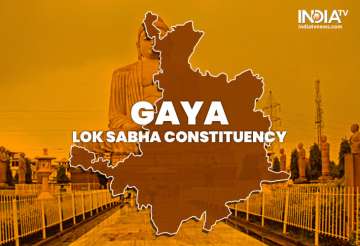Gaya's heritage should be an election issue but has never been made one: Residents
Till just a week ago, its outer courtyard was used as a cricketing ground by local boys, many of whom will be voting for the first time on April 11 when Gaya goes to the polls in the first round of the seven-phased Lok Sabha election.
It could have been a museum, a precious recall of an era gone by or even a heritage hotel. But the century-old Tilha Dharamshala, with its facade of ornate Rajasthani carvings, has been turned into a utilitarian, badly maintained polling station instead.
Security forces have temporarily taken over this capacious but ill-kept lodging facility, standing forlorn in one corner of this historic city.
Till just a week ago, its outer courtyard was used as a cricketing ground by local boys, many of whom will be voting for the first time on April 11 when Gaya goes to the polls in the first round of the seven-phased Lok Sabha election.
The fact that Gaya's heritage value has been undervalued and neglected by successive governments is a continuing source of frustration, several debutant voters said.
According to Shiv Shanker Kumar, a 19-year-old student of Anugrah Memorial College, living near the iconic dharamshala, Gaya's heritage should be an election issue but has never been made one.
The town could have been a crowd puller, like its more famous twin Bodh Gaya, but that never happened, he said.
"We wouldn't have been playing here if this place was properly maintained and used. The walls and ironwork are decaying. Inside, the guests are greeted with 'paan' stains. This is a private property, and the city administration or even state government has no heritage preservation policy for the upkeep of such buildings," he said.
Suraj Kumar, a student of Gaya College, added that the heritage of the city is crumbling, and no tourists, domestic or foreign, come to see the many beautiful buildings dotting the town even though they come to Bodh Gaya next door.
The city, he said, also lacks civic amenities.
"We would be very proud if our city gets a heritage tag at any level. But politicians come here every election, make speeches, target their opponents and then go back, only to return in the next polls. Gaya remains where it is," Suraj said.
The two-storey Tilha Dharamshala, having 82 rooms, which is run by the Rai Soorajmull Bahadur Charitable Trust, isn't the only architectural heritage in a state of decay.
Gaya has several beautiful colonial-era buildings, including those housing several government offices, ancient temples and old inns. Many are in a bad shape. Some like the Gaya Bar Library have lost their original character due to modern day interventions.
So, while the Gaya Collectorate, a handsome single-storeyed 19th century red edifice fenced by wrought-iron railings, and the 1891-built Gaya District Board buildings are fairly well-maintained, there are many that are not.
The Civil Court, the Gaya Zilla School, the Gaya Public Library and the historic Dak Bungalow are desperately in need of maintenance.
Only the Vishnupad Temple, Brahmayoni Hill and Pretshila Hill fall under the ambit of the Bihar State Archaeology department despite many 19th century buildings, including private homes.
While residents wait for a heritage tag for their city, many heritage building owners have begun to dismantle their once regal mansions. Several old houses are just decaying for lack of funds or government policy or both.
Krishna Lal, from the erstwhile Nakphopha zemindari, pointed to an old gate with a lion insignia to make his point.
"This is the gateway to our mansion, which is not in very good condition. The modern structures seen here have come up in what was once the gardens of our palatial house. We just manage to earn some rent from guests," the 70-year-old said. Sachchidanad Mishra, a Hindu priest, said Gaya has been promoted in the tourism sector only as a place to conduct the ritual of 'pind dan' (offering to ancestors). During September-October, all 'dharmshalas' and bungalows are full, he said.
"Other than the Vishnupad Temple and the mythical significance of 'pind daan', and a few hills neighbouring the town, Gaya has not really been projected as a heritage city unlike its twin city Bodh Gaya," the 49-year-old said.
Bodh Gaya, a holy city revered by Buddhists, is about 15 km from Gaya, town, and home to the UNESCO World Heritage Site of the Mahabodhi Temple complex, which is visited by devotees and travellers from around the world, including Hollywood actors.
But Gaya, despite its rich ancient and colonial history, has been overshadowed by its more famous twin.
Asked about the status of the 19th century collectorate building that houses his office, Gaya District Magistrate Abhishek Singh said there is no heritage tag as yet but they might apply for it in the future.
"But the issue is also that such a tag then impedes infrastructure development prospects as well," he said.
Gaya was chosen as one of the 12 cities under the national Heritage Development and Augmentation Yojana (HRIDAY) launched in January 2015.
Under the scheme, Rs 40 crore was allocated to the city, the only one chosen from Bihar.
"Gaya has all the qualities to become a heritage city. All that is needed is proper planning and projecting the history and old buildings to promote heritage tourism. Some officials from the 'HRIDAY' scheme had come down to take the project further in Gaya, but nothing concrete has moved in that direction so far," a senior Bihar government official said.
Tilha Dharamshala was a polling station in 2014 too.
Whether it will continue to serve as a utilitarian building or be redeemed as a more vibrant space in future, only time will tell.
Meanwhile, people vote on Thursday and heritage is not an electoral agenda.
Lok Sabha Elections in India will be held in 7 phases starting April 11. Counting of the votes will be done on May 23.
